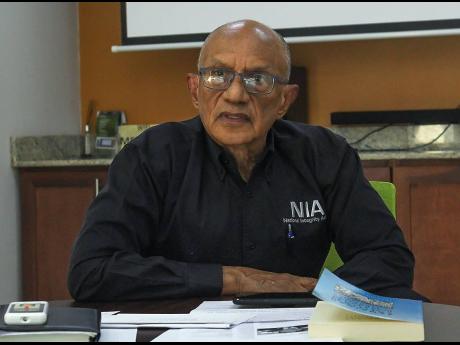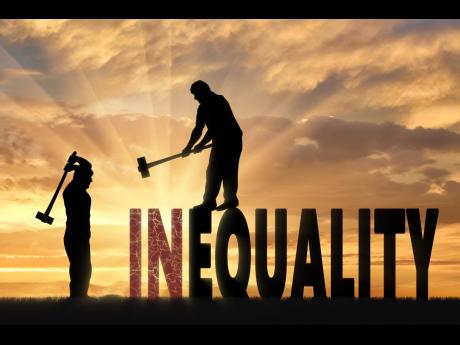Trevor Munroe | Recover – but sanitise better against the inequity virus
Washing hands, wearing masks and avoiding large gatherings are the surest ways to slow down the spread of the COVID-19 infection and to facilitate recovery. Similarly, more effective sanitising of Jamaica’s social and economic order against the inequity virus, based on colour, class, gender, is our best protection against the further spread of the seriously harmful effects on our society, namely, the weakening of social ties, the growth of conflict, and, ultimately, the breakdown of social order. This is not by any means a new advisory. Exactly 60 years ago, in 1961, Edward Seaga, then the youngest member of the Legislative Council, warned Jamaica against the inequity virus when he highlighted the need, especially during the high levels of economic growth then being experienced, to urgently close the widening gap between “the haves” and “have-nots” in Jamaica.
In the decades following independence, many steps were taken towards this objective – the establishment of the National Insurance Scheme, the national minimum wage, the repeal of the Master and Servants Act, the legislating of the workers’ rights to join trade unions, equal pay for women for equal pay with men, the NHT, the establishment of HEART, etc. Despite these measures, inequity remained and was identified across a wide range of Jamaica’s institutions and social endeavours.
• In 1992, the Task Force on Crime headed by Mr Justice Wolfe was forced to urge, in the face of obvious disparity, we “must go after the white-collar criminal with the same zeal that we go after the gunman”.
• In September 2004, the report of the Task Force on Education identified continuing inequity in outcomes between tradition high schools on one hand and other secondary institutions attended by the majority of secondary-level students.
• In 2007, the Justice Reform Task Force Report, while acknowledging strengths in the Jamaican justice system, assessed that “the Jamaican justice system is too unequal – there is a lack of equality between the powerful wealthy litigants and the under-resourced litigants”. (page 49).
However, despite repeated diagnoses and recommendations for sanitising, inequity persisted and, with it, growing social maladies, particularly increasing disregard for law and order.
In the economy, for example, by 2013 the International Monetary Fund named Jamaica as having the second-highest level of income inequality in the Western Hemisphere.
SUSTAINABLE DEVELOPMENT
By 2015, the global nature of this and other challenges led the United Nations and the vast majority of countries in the world, including Jamaica, to recognise and declare that there cannot be any sustainable development without the achievement of 17 Goals. Among them, Goal #10, “reduce inequalities within countries”. Additionally, Goal #5, “gender equality”, and Goal #16, “peace, justice and strong institutions”.
• Despite all of this, Jamaica’s sanitisation of inequity needed to be far more effective. Jamaica Survey of Living Conditions 2017, published by the PIOJ, found “inequality … at a level similar to … 2008 at the height of the global recession”.
• Almost four of every 10 households in the poorest 20 per cent of Jamaica’s population still had to use pit latrines.
• Almost seven of 10 households in the poorest 20 per cent reported no access to Internet/computers, compared to three out of 10 in the richest 20 per cent.
• Only four of every 100 Jamaicans in the poorest 20 per cent of the population had health insurance compared to 40 per cent in the wealthiest quintile.
• Additionally, a 2017 study out of UWI’s Sir Arthur Lewis Institute of Social and Economic Studies, appropriately titled ‘Excluded citizenship: the plight of squatters in Jamaica’, found that over 700,000 Jamaicans lived in overcrowded settlements with no clean water, inadequate sensitisation, no access roads, high unemployment and high school dropouts, as well as serious health and environmental problems.
Most troubling of all, the Commitment to Reduce Inequality Index found Jamaica in 2020 was behind Caribbean counterparts and lowly placed in the global community. This index, developed by OFAM and Development Financial International, scores and ranks countries on the basis of their policy and policy implementation in three areas: Labour rights, taxation policy, and social protection. Taking these three areas together, the 2018 CRI Index scored and ranked Jamaica at 96 of 157 countries and placed us at number 22 of 25 countries in Latin America and the Caribbean. The 2020 index, however, saw Jamaica falling to 120 of 158 countries and second to last in the Latin American and Caribbean region, well behind Barbados, Trinidad and Tobago, The Bahamas, Antigua, St Vincent and St Lucia. The 2020 CRI report acknowledged what we have experienced in Jamaica, “the coronavirus has exposed the scale of inequality across the world”, and the report urged “government action to radically reduce inequality”.
We in Jamaica have an additional set of reasons to “radically reduce inequality” in so far as this condition is an endemic underlying factor contributing to multiple dysfunctions: declining trust and confidence in our democratic institutions, the epidemic of violence and of murder, the twin evils of organised crime and corruption, etc.
DELIVER URGENTLY ON AGREEMENTS
In this environment, the governmental authorities, private sector and civil society should not need any more diagnoses of the kind which Edward Seaga gave 60 years ago and successive reports analysed and made multiple recommendations. What is needed now is an all-of-Jamaica, all-of-government approach to deliver urgently on agreements and recommendations to deal with more effective sanitising of inequity from our educational system, in housing, in the justice system, in our labour market, more timely implementation of the Consensus on Crime and Violence (agreed in August 2020) and enforcement of appropriate procurement arrangements, particularly in ensuring transparency, accountability, value for money and a level playing field for qualified bidders.
Particularly in respect of COVID-19, we should ensure transparency and equity in the vaccine arrangements, in request for tenders to provide goods and services, the publication of bids and the successful entities and “their beneficial owners”. Comprehensive and effective action to enhance equity across the board in these areas will go a far way to restore confidence, reduce conflict, and ultimately strengthen sanitisation against the virus of violence.
In this month of February, marking Black History and celebrating the birth of Bob Marley on February 6, it is timely to recall one set of his immortal lyrics: “until there is no longer first-class and second-class citizens of any nation … mi say war; until human rights are equally guaranteed to all … dis a war… and we know we shall win, we are confident in the victory of good over evil … yeah”.
- Professor Trevor Munroe CD, DPhil (Oxford), is principal director, National Integrity Action. Send feedback to info.niajamaica.org or columns@gleanerjm.com.


